In this blog post, we’ll delve into the world of super seeds and explore the top six healthiest options for your body. Seeds may be small, but they pack a powerful punch when it comes to nutrition. From chia seeds to sunflower seeds, these tiny wonders offer a treasure trove of health benefits.Get ready to discover how these little seeds can make a big difference in your well-being!
Chia Seeds: Tiny Seeds, Big Benefits
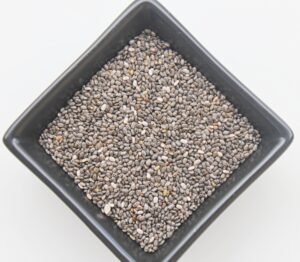
The health benefits of chia seeds are numerous and diverse, making them a popular choice for those seeking to improve their overall well-being. Here are some of the key health benefits:
- Rich in Omega-3 Fatty Acids: Omega-3 fatty acids are important unsaturated fats found in both plant and animal sources. They play a crucial role in digestion and overall health. There are three main types: ALA from plants, and EPA and DHA from fish oils. ALA sources include walnuts, chia seeds, and flaxseed oil. Our bodies can convert ALA into EPA and DHA, which are essential for various bodily functions. Chia seeds are particularly rich in ALA, which is beneficial for heart health. Increasing omega-3 intake relative to omega-6 can reduce inflammation and lower the risk of chronic diseases like heart disease and cancer. Adding chia seeds to your diet is an easy way to boost your omega-3 intake and improve overall health.
- High in Antioxidants: Chia seeds are a great source of antioxidants like chlorogenic acid and quercetin, which can protect your heart and liver and may even have anti-aging and anticancer properties. They also contain omega-3 fatty acids and other nutrients that boost immunity and reduce inflammation. Adding chia seeds to desserts is an easy way to enjoy their benefits. Studies suggest that these antioxidants can improve overall health and protect cells from damage.
- Vitamins: Chia seeds are particularly rich in B vitamins like niacin, folic acid, thiamine, and riboflavin, as well as vitamin E, which is important for overall health. They also contain minerals and omega-6 fatty acids that aid in the absorption of fat-soluble vitamins like A, D, E, and K. Incorporating chia seeds into your diet can help boost metabolism and support overall health.
- Minerals: Chia seeds are packed with essential minerals like manganese, phosphorus, copper, selenium, iron, magnesium, and calcium. These minerals play various roles, from building strong bones to regulating nerve impulses and hormone production. Incorporating chia seeds into your diet can help ensure you get these important minerals for overall health.
Flaxseeds: Nutrient-Rich Superstars
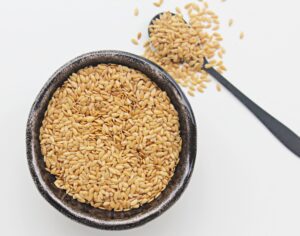
Flaxseeds are renowned for their numerous health benefits, making them a popular addition to many diets. Here are some of the key health benefits of flax seeds:
- Rich in Omega-3 Fatty Acids: Flaxseeds are one of the best plant-based sources of alpha-linolenic acid (ALA), a type of omega-3 fatty acid. Omega-3 fatty acids are essential for heart health, brain function, and reducing inflammation in the body.
- High in Fiber: Flaxseeds are an excellent source of soluble and insoluble fiber, which promotes digestive health by supporting regular bowel movements, preventing constipation, and aiding in the removal of toxins from the body.
- Balances Hormones: Flaxseeds contain lignans, phytochemicals with estrogenic properties that can help balance hormone levels in the body. This may be beneficial for women experiencing menopausal symptoms, such as hot flashes and night sweats.
- Supports Weight Management: The combination of fiber, protein, and healthy fats in flaxseeds can help promote satiety and reduce appetite, making them a valuable addition to weight loss and weight management plans.
Hemp Seeds: Protein-Packed Superstars
Hemp seeds are packed with nutrition, offering a variety of health benefits. Here are some of the key health benefits of hemp seeds:
- High in Protein: Hemp seeds are considered a complete protein source, meaning they provide all nine essential amino acids that the body cannot produce on its own. This makes them an excellent protein source for vegetarians, vegans, and those looking to increase their protein intake.
- Rich in Healthy Fats: Hemp seeds are high in polyunsaturated fats, including omega-3 and omega-6 fatty acids, in an optimal ratio for human health. These fats are essential for brain function, heart health, and reducing inflammation in the body.
- Boosts Immune Function: Hemp seeds are rich in vitamins and minerals, including vitamin E, zinc, and magnesium, which play important roles in immune function and overall health. Consuming hemp seeds regularly can help support a healthy immune system and reduce the risk of infections and illnesses.
- Reduces Inflammation: Hemp seeds contain gamma-linolenic acid (GLA), a type of omega-6 fatty acid with anti-inflammatory properties. Consuming hemp seeds may help reduce inflammation in the body, which is linked to various chronic diseases, including arthritis, diabetes, and heart disease.
Pumpkin Seeds: Nutritious and Versatile
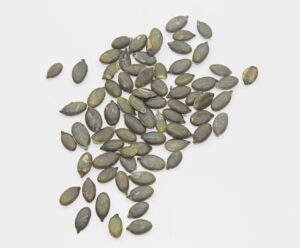
Pumpkin seeds, also known as pepitas, are not only delicious but also offer a range of health benefits. Here are some key health benefits of pumpkin seeds:
- Rich in Nutrients: Pumpkin seeds are a nutritional powerhouse, containing a variety of vitamins, minerals, and antioxidants. They are particularly high in magnesium, manganese, phosphorus, iron, zinc, and vitamin K, all of which are essential for overall health.
- Promotes Prostate Health: Pumpkin seeds contain compounds called phytosterols, which have been shown to help reduce symptoms of benign prostatic hyperplasia (BPH), a condition characterized by enlargement of the prostate gland. Regular consumption of pumpkin seeds may help improve urinary function and reduce the risk of prostate problems in men.
- Antioxidant Properties: Pumpkin seeds are rich in antioxidants, including vitamin E, phenolic acids, and carotenoids, which help neutralize free radicals in the body and reduce oxidative stress. This can help protect cells from damage, reduce inflammation, and lower the risk of chronic diseases such as cancer, diabetes, and heart disease.
- Supports Sleep: Pumpkin seeds are a good source of tryptophan, an amino acid that is converted into serotonin and then melatonin in the body. Melatonin is a hormone that regulates sleep-wake cycles, and consuming foods rich in tryptophan, such as pumpkin seeds, may help improve sleep quality and duration.
Sunflower Seeds: A Source of Healthy Fats and More
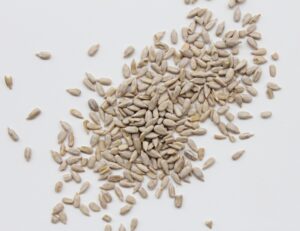
Sunflower seeds offer a plethora of health benefits, making them a valuable addition to any diet. Here are some of the key health benefits of sunflower seeds:
- Antioxidant Properties: Sunflower seeds are rich in antioxidants, including vitamin E, selenium, and phenolic compounds, which help protect cells from damage caused by free radicals. Antioxidants have anti-inflammatory properties and may reduce the risk of chronic diseases such as cancer, diabetes, and heart disease.
- Promotes Skin Health: The vitamin E content in sunflower seeds contributes to healthy skin by protecting it from sun damage, reducing inflammation, and promoting skin cell regeneration. Including sunflower seeds in your diet may help improve skin hydration, elasticity, and overall appearance.
- Boosts Immune Function: Sunflower seeds are rich in selenium, a mineral that plays a key role in immune function by supporting the production of white blood cells and antibodies. Selenium also has antioxidant properties that help protect cells from damage and reduce inflammation in the body.
Sesame Seeds: Tiny Seeds, Significant Health Advantages
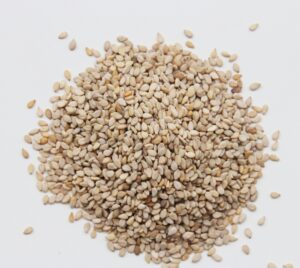
Sesame seeds may be small, but they offer a range of health benefits. Here are some of the key health benefits of sesame seeds:
- Rich in Nutrients: Sesame seeds are packed with essential nutrients, including protein, healthy fats, fiber, vitamins, and minerals. They are particularly high in copper, manganese, calcium, magnesium, iron, phosphorus, and zinc, all of which are important for overall health.
- Antioxidant Properties: Sesame seeds are rich in antioxidants, including sesamin, sesamol, and sesamolin, which help protect cells from damage caused by free radicals. Antioxidants have anti-inflammatory properties and may reduce the risk of chronic diseases such as cancer, diabetes, and heart disease.
- Supports Digestive Health: Sesame seeds are a good source of dietary fiber, which promotes digestive regularity, prevents constipation, and supports a healthy gut microbiome. Including sesame seeds in your diet can help improve digestion and reduce the risk of digestive disorders such as irritable bowel syndrome (IBS) and colon cancer.
- Regulates Blood Sugar Levels: Sesame seeds have a low glycemic index and are rich in fiber, protein, and healthy fats, which help slow down the absorption of sugar into the bloodstream and prevent spikes in blood sugar levels. Including sesame seeds in meals or snacks can help stabilize blood sugar levels and reduce the risk of insulin resistance and type 2 diabetes.
Nutrition from Nature: 8 Healthiest Nuts You Should Be Eating
More Articles from NutriQuorum
Quinoa: The Golden Seed of Nutrition and Flavor
5 Health Boosters: Vitamin-Packed Fruits for Your Wellness
Purple Powerhouse: Exploring the Health Benefits of Eggplant
Millet: The Ancient Superfood for Health and Flavor
Culinary Medicine: The Healing Power of Spices
5 Super Foods You Need To Know About
Ways to Incorporate the Super Seeds Into the Diet
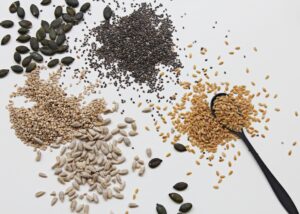
Here are some creative ways to include all those super seeds into your diet:
- Smoothies: Add a tablespoon of chia seeds, hemp seeds, or flaxseeds to your favorite smoothie recipe for an extra boost of nutrition. Green Smoothie fro Energy.
- Breakfast: Sprinkle a handful of seeds (chia seeds, flaxseeds, or hemp seeds) over your morning oatmeal, yogurt parfait, or cereal for added crunch and nutrition.
- Salads: Toss a handful of pumpkin seeds, sunflower seeds, or sesame seeds into your salads for added texture and flavor. They pair well with leafy greens, vegetables, fruits, and a variety of dressings.
- Baked Goods: Incorporate ground flaxseeds or chia seeds into baked goods like muffins, cookies, bread, and pancakes. They can be used as egg substitutes (1 tablespoon of ground seeds mixed with 3 tablespoons of water equals one egg) and add moisture and nutritional value to recipes.
- Energy Bites: Make homemade energy bites or granola bars using a combination of seeds, nuts, dried fruits, and sweeteners like honey or maple syrup. Roll the mixture into bite-sized balls and refrigerate for a quick and nutritious snack.
- Stir-Fries and Grain Bowls: Sprinkle toasted sesame seeds or hemp seeds over stir-fries, grain bowls, or Asian-inspired dishes for added flavor, protein, and texture. They complement rice, quinoa, noodles, vegetables, tofu, and meat.
- Homemade Trail Mix: Create your own trail mix by combining a variety of seeds (pumpkin seeds, sunflower seeds, hemp seeds) with nuts, dried fruits, and dark chocolate chips. Portion it into snack-sized bags for a convenient and nutritious on-the-go snack.
- Soups and Stews: Garnish soups, stews, and chili with toasted pumpkin seeds or sunflower seeds for added crunch and nutrition. They add a delicious finishing touch to savory dishes.
- Homemade Dressings and Sauces: Use tahini (made from sesame seeds) as a base for homemade salad dressings, dips, and sauces. You can also blend seeds into pesto, hummus, or salsa for added flavor and nutritional benefits.
- Yogurt Parfaits: Layer Greek yogurt with fresh fruits, granola, and a sprinkle of chia seeds or hemp seeds for a nutritious and satisfying breakfast or snack option.
Recipes with Super Seeds
3 Irresistible Chia Pudding Recipes
Green Smoothie to Boost Your Energy
Chickpea Sandwich for Busy Mornings
A Nutrient-Packed Plant Power Bowl Recipe
Tahini Orange Dressing to Elevate Your Salads





